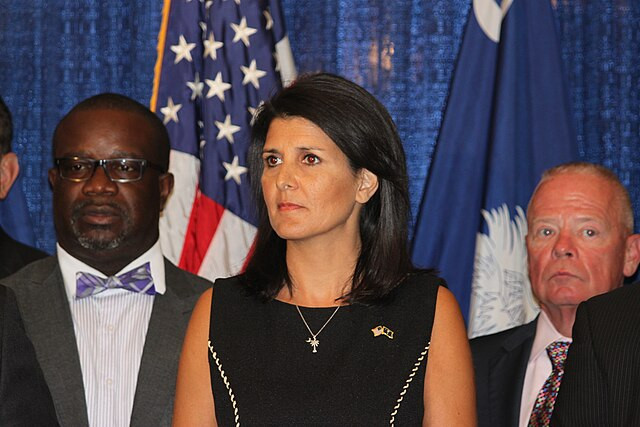In the complex and often contentious arena of Republican politics, Nikki Haley, the former U.S. Ambassador to the United Nations, is navigating a challenging path towards the GOP presidential nomination. Recent comments by MSNBC host Lawrence O'Donnell and the ongoing influence of former President Donald Trump have highlighted the intricate dynamics shaping her campaign.
Lawrence O'Donnell, on a recent MSNBC segment, presented a provocative analysis of Haley's performance in the Iowa caucuses, where she placed third behind Donald Trump and Ron DeSantis. O'Donnell suggested that Haley's struggle in the primaries could be attributed to a belief among a significant portion of Republican voters that, as a child of immigrants, she represents what Trump has controversially referred to as "poisoning the blood of the country." This assertion reflects the deep-seated issues of immigration and identity politics within the GOP electorate.
According to O'Donnell, "81% of Republican primary voters and caucus participants agree with Donald Trump that immigrants are poisoning the blood of this country." He argued that this belief poses an insurmountable obstacle for Haley, as these voters view her as part of the problem Trump describes. This perspective underscores the profound challenges faced by candidates like Haley, who must navigate a political landscape deeply influenced by Trump's rhetoric and policies.
Trump himself has questioned Haley's eligibility for the presidency, citing her parents' immigrant status at the time of her birth in 1972. This stance was echoed in an article shared by Trump on Truth Social, which suggested that Haley's candidacy could be disqualified under the 12th Amendment. Despite these claims, Haley secured seven delegates in the Iowa caucuses with 19.1% of the vote, trailing behind DeSantis and Trump, who won the caucus with 51% of the vote.
Amidst these challenges, Haley remains focused on her presidential campaign, dismissing speculation about potential vice-presidential picks. In an interview with NewsNation's "On Balance," Haley stated that she is not yet considering her running mate but is committed to strengthening her position in key states like Iowa, New Hampshire, and South Carolina. Her determination is evident in her remarks: "I don't play for a second. I've never played for a second. I'm not going to start now. I'm not interested in being vice president. I'm running to be president and I'm running to win and we will," as she told CBS News.
However, the shadow of Donald Trump looms large over Haley's aspirations. Trump's son, Donald Trump Jr., expressed a vehement opposition to Haley being considered as a potential vice-presidential candidate for his father, labeling her as a proponent of "never-ending wars" and a "puppet of the establishment."
The contrast between Trump's and Haley's visions for the Republican Party is stark. Haley's emphasis on winning the majority of Americans and her critique of the potential for a "nail biter" election against Biden or Harris suggest a different strategic approach from Trump's. The division within the Republican Party, between Trump's loyal base and those seeking a new direction, is exemplified in Haley's campaign.
As the GOP primary race intensifies, the discourse around immigration, identity, and political strategy becomes increasingly relevant. Haley's journey reflects the broader challenges faced by candidates who diverge from the Trump-era Republican playbook. Whether she can overcome these obstacles and appeal to a broader base of Republican voters remains a key question in the race.
Haley's campaign, thus, serves as a barometer for the evolving nature of the Republican Party and the impact of Trump's legacy on its future direction. The outcome of this primary race will not only determine the GOP's presidential nominee but also shape the party's identity and approach in the years to come.






